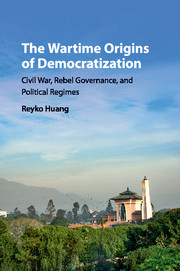Book contents
- Frontmatter
- Contents
- List of Figures
- List of Tables
- List of Acronyms
- Acknowledgments
- 1 Introduction
- 2 War-Making, Mobilization, and Democratization
- 3 Rebel Governance: How Rebels Interact with Ordinary People During Conflict
- 4 Testing the Effects of Rebel Governance on Postwar Democratization
- 5 Tracing the Steps from War Time to Peace Time: Case Studies Overview
- 6 War and Change in Nepal
- 7 War and Postwar Regime Formation in Uganda, Tajikistan, and Mozambique
- 8 Conclusion
- Appendix Rebel Governance Dataset: Notes, List of Cases, and Summary Statistics
- Bibliography
- Index
6 - War and Change in Nepal
Published online by Cambridge University Press: 05 September 2016
- Frontmatter
- Contents
- List of Figures
- List of Tables
- List of Acronyms
- Acknowledgments
- 1 Introduction
- 2 War-Making, Mobilization, and Democratization
- 3 Rebel Governance: How Rebels Interact with Ordinary People During Conflict
- 4 Testing the Effects of Rebel Governance on Postwar Democratization
- 5 Tracing the Steps from War Time to Peace Time: Case Studies Overview
- 6 War and Change in Nepal
- 7 War and Postwar Regime Formation in Uganda, Tajikistan, and Mozambique
- 8 Conclusion
- Appendix Rebel Governance Dataset: Notes, List of Cases, and Summary Statistics
- Bibliography
- Index
Summary
On April 24, 2006, ten years after a Maoist rebel group launched an insurgency against the state, the king of Nepal capitulated to widespread demands to hand power back to the people. In the face of mass demonstrations in the capital, the king conceded the restoration of parliament, which he had suspended in a royal coup in 2005, along with plans to form an elected constituent assembly that would draft a new constitution. This watershed event was merely the first in a string of surprising developments. Within months the incumbent political parties and the Maoists signed a peace agreement, turning the violent rebel group into a formal political party and bringing the civil war to an end. Once democracy had been restored, Nepalese citizens voted overwhelmingly for the Maoists in the 2008 constituent assembly elections. The newly created constituent assembly then promptly voted to abolish the monarchy once and for all. The composition of the postwar assembly was also unprecedented: groups that had been historically marginalized in the government, including women, ethnic minorities, and members of the lower castes, now had seats specifically allocated to them. To put it starkly, a civil war that claimed over 13,000 lives resulted in the elimination of the royal autocrat, the creation of a republic, and the establishment of a nascent multiparty democracy in which individuals across the social ranks enjoyed greater political and civil rights than ever before in the country's history.
As a senior government official put it, “democracy is a byproduct of the war. It wasn't a goal of the Maoists. The Maoists had launched a war against a democratic system” (Interview, Kathmandu, January 25, 2011). How, then, did violent conflict between a country's own citizens result in democratization, the sharing of power between erstwhile opponents, increased political rights, and more equal representation?
Earlier chapters provided statistical evidence of a positive correlation between the degree of rebel reliance on civilians and post–civil war democratization. The analysis also showed that the extent of rebels’ wartime institution-building has little or no bearing on postwar regimes and that, if anything, the effect is toward postwar autocratization.
- Type
- Chapter
- Information
- The Wartime Origins of DemocratizationCivil War, Rebel Governance, and Political Regimes, pp. 116 - 139Publisher: Cambridge University PressPrint publication year: 2016

